
Abruzzo, historically known as Abruzzi, is a region of Southern Italy with an area of 10,763 square km and a population of 1.3 million. It is divided into four provinces: L'Aquila, Teramo, Pescara, and Chieti. Its western border lies 80 km (50 mi) east of Rome. Abruzzo borders the region of Marche to the north, Lazio to the west and north-west, Molise to the south and the Adriatic Sea to the east. Geographically, Abruzzo is divided into a mountainous area in the west, which includes the highest massifs of the Apennines, such as the Gran Sasso d'Italia and the Maiella, and a coastal area in the east with beaches on the Adriatic Sea.

The province of Pescara is a province in the Abruzzo region of Italy. Its capital is the city of Pescara, which has a population of 119,483 inhabitants. As of 2017, it has a total population of 319,936 inhabitants over an area of 1,230.33 square kilometres (475.03 sq mi). The provincial president is Antonio Zaffiri and the province contains 46 comuni.
San Giovanni Teatino is a comune and town in the Province of Chieti in the Abruzzo region of Italy. Until 1894 this comune was known as Forcabobolina. Situated on a hill overlooking the valley of the river Pescara (Aterno-Pescara), in recent years the place has undergone an industrial development, especially in the area of Sambuceto. Abruzzo Airport is also located in a portion of the municipal territory, close to the border with Pescara. In fact, the municipality is virtually divided into two, San Giovanni Teatino (Alto), which is the historic village on the hill, and the aforementioned Sambuceto, an ever-growing urban settlement, home to a large shopping area and an important industrialized area.<>

Serramonacesca is a comune and town in the province of Pescara in the Abruzzo region of southern Italy.

The Gran Sasso and Monti della Laga National Park is a natural park in central Italy. Established in 1991, it covers an area of 2,014 square kilometres (778 sq mi), mostly within the provinces of Teramo, L'Aquila, and Pescara in Abruzzo, with small areas in the provinces of Rieti in Lazio and Ascoli Piceno in Marche. The terrain is predominantly mountainous with alpine plains.

San Liberatore a Maiella is an abbey and church in the territory of Serramonacesca, in the province of Pescara, region of Abruzzo, Italy.
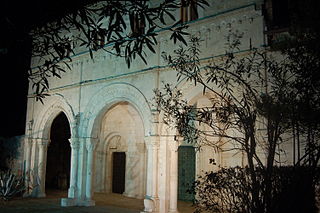
The abbey of San Clemente a Casauria is an abbey in the territory of Castiglione a Casauria, in the province of Pescara, Abruzzo, Central Italy.

The Abbey of San Giovanni in Venere is a monastery complex in the comune of Fossacesia, in Abruzzo, central Italy. it is located on a hill facing the Adriatic Sea, at 107 m over the sea level.
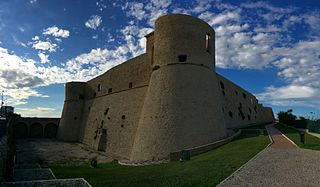
Castello aragonese is a Renaissance castle in Ortona, Province of Chieti (Abruzzo).

Tourism in Abruzzo has become one of the most prosperous sectors in the economy of Abruzzo, and in recent years has seen a remarkable growth attracting numerous tourists from Italy and Europe. According to statistics, in 2021 arrivals totaled 1,330,887. A total of 5,197,765 arrivals were tourists, a figure that puts the region seventeenth among the Italian regions for numbers of tourists per year. A moderate support to tourism is also given to the Abruzzo Airport with many low cost and charter flights connecting the entire region with the rest of Europe.

The Castle of Fossa is a Middle Ages castle in Fossa, province of L'Aquila, Abruzzo, southern Italy.
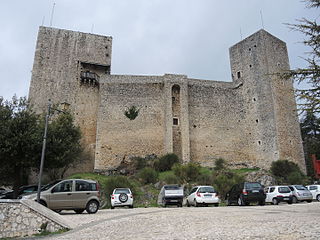
Castello di Pereto is a Middle Ages castle in Pereto, Province of L'Aquila (Abruzzo), Italy.

Castello Masciantonio is a Renaissance castle in Casoli, Province of Chieti (Abruzzo).
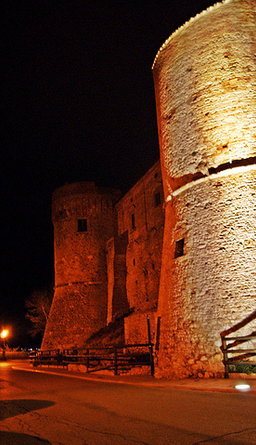
Castello di Monteodorisio is a Middle Ages castle in Monteodorisio, Province of Chieti (Abruzzo).

Castello di Roccascalegna is a medieval castle in Roccascalegna, Province of Chieti, Abruzzo, southern Italy.

Castello di Salle is a Middle Ages castle in Salle, Province of Pescara, Abruzzo, Italy.
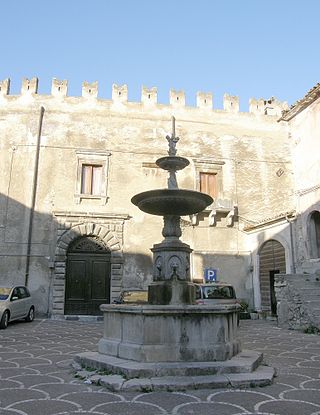
Castello Mediceo is a Middle Ages castle in Bussi sul Tirino, Province of Pescara (Abruzzo).

The Ducal Castle of Carpineto Sinello is a Renaissance castle in Carpineto Sinello, province of Chieti, Abruzzo, southern Italy.

Torre e Palazzo de Felice is a fortified baroque palace built into a medieval castle in Rosciano, Province of Pescara (Abruzzo). Built on the north bank of the River Pescara, it is an ancestral home of the de Felice family.
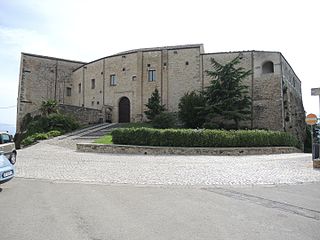
Castello De Sterlich-Aliprandi is a fortified palace in Nocciano, Province of Pescara (Abruzzo).




















